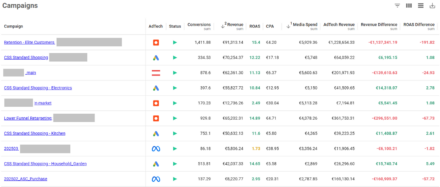Do New Cookie Choices in Europe Signal a Move to Cookieless Attribution?

There is little doubt that the recent announcement by Google, that it is introducing what are ultimately clearer cookie choices for web users in the EU, are as a result of a number of factors. Which range from the concerns of regulators and privacy campaigners, to fines being placed directly on the company itself.
It also has to be viewed in the broader context of the impending changes that are happening to third-party cookies in general. But what are the broader ramifications for the ad industry?
And, as third-party cookies slowly fade into the sunset, is cookieless attribution the only true way to futureproof your analytics?
What cookie consent changes is Google making?
As anyone who has browsed the web in the past few years knows – which is more or less all of us – the previous incarnation of Google’s cookie consent pop-up was confusing at best. Making it deliberately difficult to reject cookies (which involved a laborious process) and at the same time making Cookie acceptance easy by comparison. As a one-click ‘accept all’ option.

The nature of this approach has consistently drawn criticism from regulators and privacy campaigners alike.
Google recently announced that they are now streamlining this process by introducing three buttons that enable users to either ‘accept all’ or ‘reject all’ – or customize their settings. And anyone using Google search in either incognito mode or while signed out of their Google Account will be presented with the new options.
The changes are planned for roll-out starting in France but will then be extended to all users in Europe and the UK.
Why is Google making these changes right now?
Concerns over the confusing use of cookies isn’t a new phenomenon. These changes are part of a wider timeline of change and activity around cookies.
But here are some of the key drivers that, we believe, are likely to have had a direct impact on Google’s current thinking.
A necessary response to recent fines and legal censure of Google
It is fair to say that Google has been under some pressure recently in two key areas.
- Fines imposed for making Cookies unnecessarily complex and misleading
Back in January this year the CNIL (Commission Nationale de l’Informatique et des Libertés) in France slapped a €150M ($170M) fine on Google for the confusing way they were presenting tracking choices. Accusing them of using underhand tactics to try and railroad through consent.
To quote CNIL directly:
” … making the refusal mechanism more complex actually discourages users from refusing Cookies and encourages them to opt for the ease of the consent button for Cookies in the first window. It considered that such a process affects the freedom of consent of Internet users.” – CNIL, 6th Jan 2022
This is alongside some fairly powerful lobbying from high profile privacy campaigner noyb. Which has been registering hundreds of complaints on actual instances of poor cookie consent options and who’s founder Max Schrems is quoted as saying:
“Companies openly admit that only 3% of all users actually want to accept Cookies, but more than 90% can be nudged into clicking the agree button.” – Max Schrems, Founder nyob
It’s difficult to make an assessment other than the fact that the size and high-profile nature of the censures above were factored into Google’s recent changes on cookie consent.
As a footnote here – CNIL also fined Facebook Ireland Ltd €60m for similar concerns around consent. Evidence if it is needed that other tech giants are feeling the collective heat from regulators. - Google Analytics was declared illegal in the EU in April 2022
The decision to adjust cookie consent also comes hot on the heels of a finding in France back in April 2022 that Google Analytics in its current state is actually illegal in the EU due to non-compliance with GDPR regulation.
Google’s response to this one is to confirm that it won’t try and change the architecture of its GA/Universal and GA 360 products which will both remain illegal as a result – it is now sunsetting both products in June 2023. And effectively forcing users across to its new GA4 product which it has confirmed will be compliant.
These enforced changes don’t tie in directly with pressure around cookie consent but may well have influenced Google’s decision-making at a broader level.
The need to regain the trust of users and the industry
Google plays a fairly pivotal role in most people’s lives these days – from how we work, to how we shop, travel and so it goes on. But it’s a relationship that needs to be built around trust and it would be fair to say that this trust has been somewhat dented recently.
Like other big tech platforms Google faces an uphill task in rebuilding trust on a number of levels:
- With consumers – who are increasingly worried about how their private data is collected, processed and used including:

- With the advertising industry as a whole – who are still trying to get to grips with the impending ‘death’ of the third-party cookie and have given a muted response to some of the cookie replacement solutions being touted by Google – as part of its privacy sandbox initiative.
The cookie consent changes are part of a broader picture
It is also worth pointing out that these latest cookie consent changes are taking place against a broad recasting of the ad industry landscape – driven by, but not limited to, the actions of Google – that includes:
- Planned end of support for third-party cookies – a commitment by Google to phase out support for third-party cookies by mid-to-late 2023 with the not inconsiderable impact on an ad industry that has relied heavily on them for targeting and personalisation
- Caution around cookie replacement proposals from Google – as we noted above, there is a cautious response across the industry to proposed Google replacement solutions for Cookies including:
- Federated Learning of Cohorts (FLoC) – an initial attempt at a solution designed to provide increased levels of privacy by bundling users into cohorts. Which ironically were deemed to potentially have more privacy issues than 3rd party Cookies. FloC is an approach Google now appears to have abandoned following industry feedback
- Topics – an attempt to redress the privacy balance above – by associating 5 ‘Topics’ against a user that advertisers can then use to target ads. Which appears to be simpler to understand than FLoC and provide more privacy but provides much narrower targeting capability
- The impact of wider industry changes – in particular the huge impact of the iOS14 update from Apple which effectively requires users to opt-in for targeted advertising and has severely impacted broader ad targeting capability on platforms like Facebook
Is cookie-free attribution the only real way to futureproof your analytics?
So, changes to consent banners on Google are the tip of the iceberg in terms of the other fundamental changes that are underway in the ad industry.
Third-party cookies are going away and the announcement of their demise has sparked a huge amount of debate on their merits and shortcomings. And a realization for marketers that they need to find a new and more effective way to analyse and attribute marketing activity. And do that quickly.
At QueryClick, we believe strongly that cookie-free attribution is the only sure-fire way to futureproof your analytics for a number of reasons. Including the fact that:
- the writing has been on the wall for third-party cookies for a considerable time – which produce data that is up to 80% incorrect for attribution purposes
- attribution solutions that harness the power of AI and Machine Learning effectively replace cookies and do a much better job!
- AI driven solutions enable you to connect the dots on complex, cross device journeys and significantly improve your marketing ROI by making informed judgements
Is cookie-free attribution a myth?
Download our eBook to find out more.
Own your marketing data & simplify your tech stack.
Have you read?
Chrome’s announcement on dropping cookie opt-in last month closed the door on a 5 year saga for marketers. But what is the landscape like in 2025 for cookie-based measurement?
Generative AI is transforming the way that marketers plan and assemble content for their Paid Ads. As big platforms like Google, Meta and TikTok increasingly build the tools needed to...
In a surprising move that has sparked heated debate, Mark Zuckerberg announced on his Instagram that Meta will be reducing its levels of censorship and in particular fact-checking on its...


